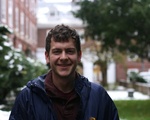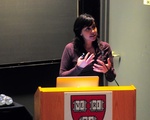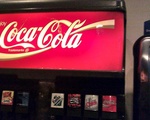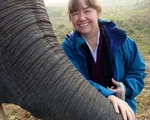Science
Redheads At Risk of Melanoma
Scientists have long believed that redheads, with their fair skin and hair, are more sensitive to sunlight than others. Last ...
Hurricane Sandy’s Wrath Linked to Climate Change ?
Hurricane Sandy brought with her not only devastating floods and forceful winds, but also a flurry of speculation about global ...
Genetic Links Found for Gastrointestinal Diseases
A study published recently in Nature found new genetic links between Crohn’s disease and ulcerative colitis, two autoimmune gut diseases ...
Female to Head Marine Lab
Harvard Medical School Professor and Radcliffe Institute fellow Joan V. Ruderman will pioneer the next era of the Marine Biological ...
Tucci Makes Chemistry Lovable
With his office door on the first floor of the Science Center always open, it’s obvious Gregory Tucci loves talking ...
SEAS Seeks to Improve Teaching
The School of Engineering and Applied Sciences is reconsidering its approach to graduate education with the hopes of enhancing students’ experience by providing more personalized guidance and resources.
Synthesis: The Future of Biotech
Stanford University Professor of Bioengineering Dr. Christina D. Smolke delivers the Neekeyfar Lecture on Math and Science entitled "Synthetic Biology: The Next Generation of Biotechnology" on Friday at the Science Center. Her enthusiasm for and breadth of knowledge about the future of scientific research were evident in her talk.
Researchers Create 3D Particles
Researchers from Harvard, New York University, and Dow Chemical have manufactured microparticles with the ability to assemble themselves into complex three-dimensional structures, a technology that could lead to developments in optical materials and ceramics
Correlation Still Doesn't Equal Causation in Soda Studies
We've all heard about the supposed health risks of drinking soda—there's too much sugar, it's bad for you, it'll rot your teeth, it'll rot your mind, etc. With so many studies and reports being published, it's hard to tell what to believe. Recently, a Harvard teaching facility has admitted to promoting inconclusive data while another Harvard study links soda consumption to increased aggression.
Naomi E. Pierce on Getting Over A Fear of Insects
In an office full of ant models, butterflies in frames, and books on Nabokov, it doesn’t take much questioning to figure out what OEB Professor Naomi E. Pierce’s greatest passion is: entomology. Having conducted research on insects for decades, Pierce’s work warranted the University to build her a greenhouse atop the Museum of Comparative Zoology laboratories. There she keeps ants who hail from all over the world. Rich with stories, Pierce sat down with The Harvard Crimson to share stories about her fear of bugs, her husband and fellow OEB professor Andrew Berry, and even a brief bit about how the similar spellings of “organismic” and “orgasmic” warrant a good enough reason to consider changing her department’s name.
Science Column: You Two? That’s My Birthday
Here are three questions for your weekend reflections. Number one: how many people would it take to build a human pyramid 22 layers tall? Number two: if 23 people in a room shake hands with everyone else exactly once, how many handshakes take place? Number three: what’s the chance that two of those 23 people have the same birthday?
Medical Tourism Raises Ethical Concerns
While millions of tourists swarm to Brazil each year to experience the lush rainforests and bustling cities, an increasing number are visiting with a different agenda—to receive cosmetic surgery. Although traveling abroad to receive medical treatment dates back to ancient Greece, the recent influx of “medical tourism” has garnered public attention. In his latest book, “Patients with Passports: Medical Tourism, Law, and Ethics,” Harvard Law School Professor I. Glenn Cohen explores various forms of medical tourism and their associated legal and ethical issues.











